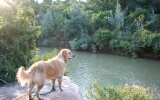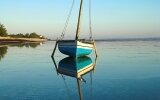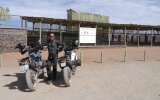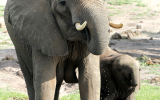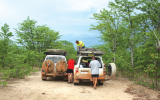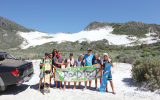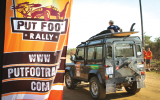- Magazine
- #readityourway
- Weekly Stories
- #shareyourstory
-
Adventure
- Abroad Travelling
- Africa Travelling
- Events
- Expos & Shows
- Festivals
- Fishing
- Free Diving
- Gliding
- Horse Riding
- Inspiring People
- Islands Travelling
- Kite/Windsurfing
- Motorbiking
- Motorised Water Sports
- Mountaineering
- Mountain Biking
- Off-road 4x4
- Off-road Motorbiking
- Paddling
- Performance Driving
- Photography
- Rock Climbing
- Rollerblading
- Sailing
- Scuba Diving
- Skateboarding
- Skydiving
- Snowboarding & Skiing
- Surfing
- Swimming
- Trail Running
- Wakeboarding
- Waveski Surfing
-
Sport
- Adventure Racing
- Fishing
- Free Diving
- Gliding
- Health & Fitness
- Horse Riding
- Inspiring People
- Kite/Windsurfing
- MMA
- Motorbiking
- Mountain Biking
- Multi-sport
- Off-road 4x4
- Off-road Motorbiking
- Paddling
- Performance Driving
- Photography
- Road Cycling
- Road Running
- Rock Climbing
- Rollerblading
- Sailing
- Scuba Diving
- Skateboarding
- Skydiving
- Snowboarding & Skiing
- Surfing
- Swimming
- Rugby
- Trail Running
- Triathlon
- Wakeboarding
- Waveski Surfing
- Lifestyle
- Calendar
Treading Lightly at Rocktail Beach Camp
Words: Melissa Andrews | Photos: Rocktail Beach Camp and Christopher List
Topic:
Africa Travelling
Topic:
Scuba Diving
Our headlights sent bright beams of light into the ink-black expanse of the night, illuminating scuttling crabs darting sideways as we approached.
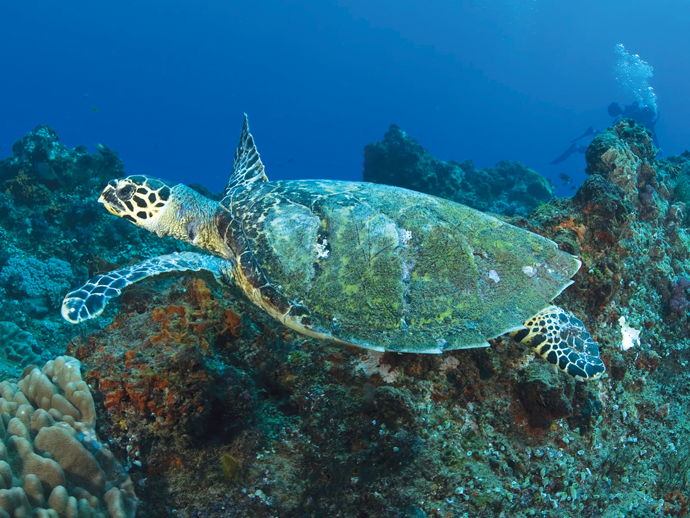
The soothing rhythm of the sea failed to lull us into a sense of complacency as we peered excitedly into the darkness, keeping a keen eye out for tracks. We were on a Rocktail Beach Camp turtle drive, accompanying our guide on his nightly research patrol to monitor the behaviour of nesting loggerhead and leatherback turtles.
We were hoping to catch a mother turtle in the act of laying up to 150 eggs, of which only a few will hatch and survive to adulthood. The 4x4 eventually slowed to a stop in front of the enormous tracks of a leatherhead; the largest turtle in the world and critically endangered. Unfortunately, she was nowhere to be seen. Our guide told us she would come ashore to lay her eggs, but, apparently confused by her hormones, had turned back.
Though our timing was perfect - loggerhead and leatherback turtles lay their eggs between October and March - our only other sighting was of the foot patrols that travelled the 8 km long beach twice a day, providing vital information on turtle nesting patterns.
This turtle research programme started back in 1963 when scientists from the Natal Parks Board (now Ezemvelo KZN Wildlife) initiated a project to monitor the number of nesting females per season and protect the beaches from further disturbance. The project expanded to include data on hatchlings in 1971. When funding dwindled, donations from Wilderness Safaris Wildlife Trust, Rocktail Bay Lodge and World Wildlife Foundation allowed it to continue, making it one of the longest running turtle projects in the world.
Its predecessor, Rocktail Bay Lodge, has since closed for refurbishment, but Rocktail Beach Camp, which is also owned by Wilderness Safaris, has stepped in to continue its pivotal role in providing research data. In addition, part of the concession fees go towards the turtle scouts that guard the nests and patrol the beaches, and the income derived from guests attending turtle drives is also fed back into the project.
Despite two drives to scout for turtles, we were one of the unfortunate few to miss seeing any hatching or laying turtles during our stay. However, there was plenty to do at Rocktail Beach Camp to make up for it. Situated in an indigenous coastal forest that forms part of the Isimangaliso Wetland Park and World Heritage Site, Rocktail Beach Camp has a Padi-accredited diving centre, Mokarran Dive Charters, which takes guests out for snorkelling or diving adventures in what is known as one of the world’s top ten dive spots. Perhaps it’s because this stretch of coast forms part of the Maputaland Marine Reserve or that there’s a gentleman’s agreement with Thonga Beach Lodge, the only other dive operation with a concession to dive in the area, but exclusive diving amid pristine coral reefs is guaranteed and gives you access to the kind of marine life that is rarely found elsewhere.
Snorkelling with masses of butterflyfish and triggerfish at Lala Nek, a secluded, shallow series of corals close to shore, we were enthralled by marbled electric rays, a honeycomb moray eel and blue-spotted stingray. We joined the dive team for another trip out to Island Rock, free-diving to the rocks below to get closer to an octopus that did its best to blend into the coral, a Spanish dancer (a sea slug that looks like the flowing skirt of a flamenco dancer when it moves) and even a Moorish idol. The underwater world was like entering a stage performance that never ended, a drama that continued regardless of your presence, while the dangerous players, such as the highly poisonous lionfish and stonefish, lay in wait for the unwary. Apparently, sharks are often spotted, including great hammerheads, tiger sharks, blacktip reef sharks and the enormous whale shark. Large numbers of pregnant spotted ragged-tooth sharks (also known as grey nurse sharks) appear in the area from late November until March and Rocktail Beach Camp assists the KZN Parks Board in monitoring and understanding what drives the arrival of this species in the area.
Though we didn’t see any sharks (fortunately or unfortunately, depending on your perspective) the sight of a picnic breakfast waiting for us on shore, complete with fresh fruit, hot tea or coffee, toast, croissants and jams, was the perfect end to a fulfilling morning.
As part of the Wilderness Safaris group, Rocktail Beach Camp has a strong commitment to responsible tourism, realising that conservation is as much about people as it is about the environment. The Wilderness Trust supports wildlife management, research and education across seven countries, while the Children in the Wilderness Programme teaches environmental and life skills to rural children living in communities alongside the wild areas in which the company operates.
Over 2% of the community (comprising approximately 1,500 people) are permanently employed at the camp, while Wilderness Safaris also supports community-based enterprise. Their latest joint venture is the Gugulesizwe Community Centre, a replica of a traditional Zulu homestead that offers overnight stays in a beehive hut and quad biking activities. And with recycling, biodegradable products and energy- and water-saving measures, Rocktail Beach Camp is a prime example of responsible tourism in action
dinFO:
Rocktail Beach Camp has 17 permanent tented rooms, each set in the trees, with beautiful, private decks and expansive views. The spacious rooms have en suite bathrooms, comfortable beds underneath a ceiling fan, and à la carte lunches and dinner buffets are served next to the pool. While not stinting on luxury and comfort, the camp has a friendly and open ambiance that encourages relaxation and camaraderie, while exemplary service ensures that you have everything you need.
Wilderness Safaris has recently launched the Wilderness Safaris African Residents Programme. To find out more about member benefits see www.wilderness-residents.co.za and contact them on
Issue:
Issue 24 Apr'13

